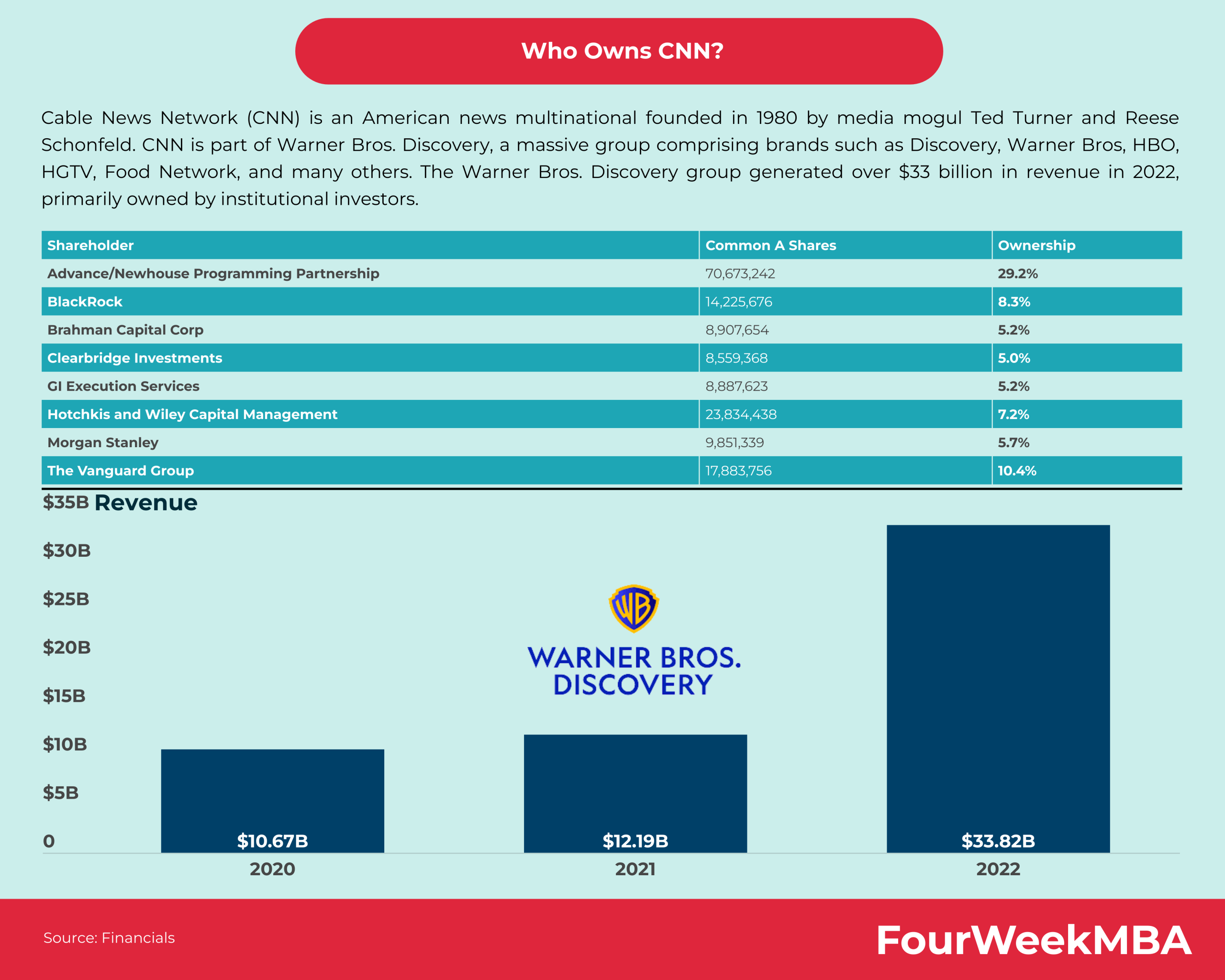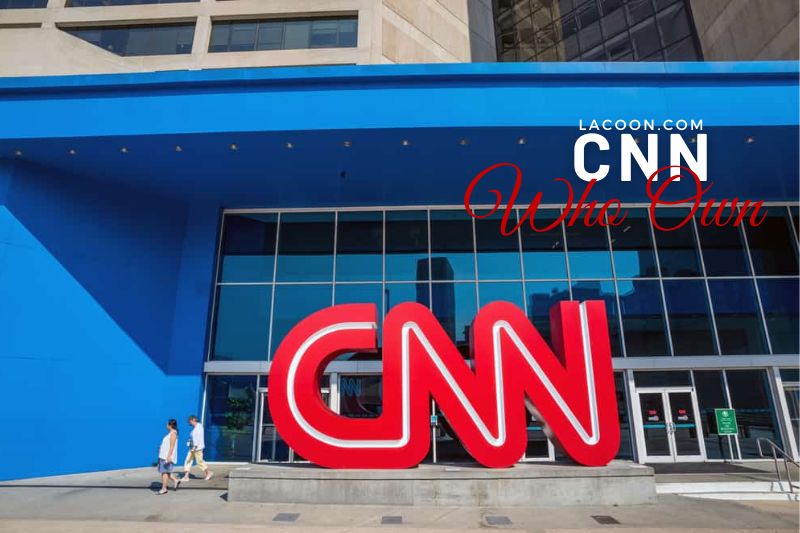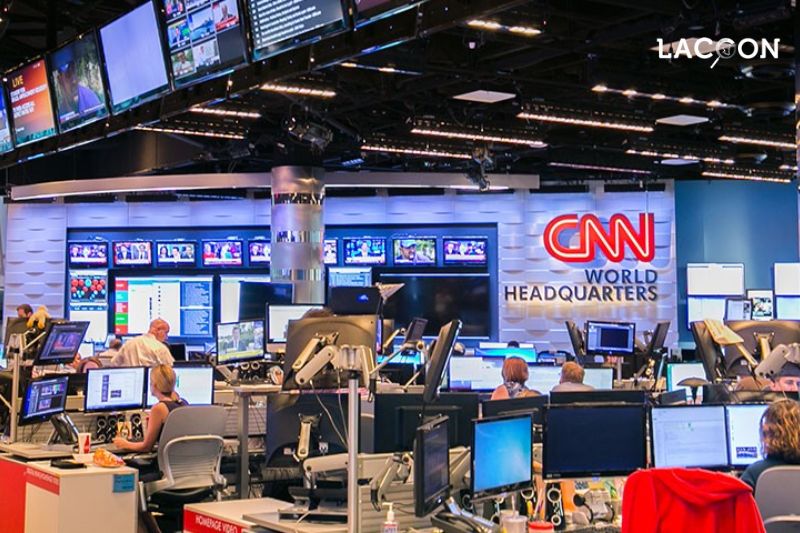The question "Who owns CNN?" has intrigued media enthusiasts, journalists, and business analysts alike. CNN, one of the most prominent global news networks, has undergone several ownership changes throughout its history. Understanding its current ownership structure provides valuable insight into the media landscape and the influence of corporate conglomerates on news dissemination.
As we delve into this topic, it is crucial to recognize the significance of CNN's role in shaping public opinion. With its vast reach and credibility, CNN's ownership plays a pivotal role in determining the type of content that reaches millions of viewers worldwide. This article aims to provide an in-depth analysis of CNN's ownership history, current ownership structure, and the implications for the future of journalism.
Throughout this article, we will explore various aspects of CNN's ownership, including its historical background, key stakeholders, and the influence of corporate conglomerates. By understanding these elements, readers will gain a comprehensive view of the forces shaping modern journalism and the media industry as a whole.
Read also:Mkvmoviespoint Your Ultimate Source For Movies And Entertainment
Table of Contents
- CNN Ownership History
- Current Ownership Structure
- Key Stakeholders in CNN's Ownership
- Influence of Ownership on CNN's Content
- Role of Corporate Conglomerates in Media
- Legal Structure and Governance
- Future Predictions for CNN's Ownership
- Global Impact of CNN's Ownership
- Ethical Considerations in Media Ownership
- Conclusion and Call to Action
CNN Ownership History
CNN, or Cable News Network, was founded by Ted Turner in 1980. It marked a revolutionary shift in the way news was delivered, becoming the first 24-hour news channel. Initially, CNN was part of Turner Broadcasting System (TBS), which Turner owned and operated. However, the ownership landscape began to change in the late 1990s.
In 1996, Time Warner acquired Turner Broadcasting System, bringing CNN under its umbrella. This acquisition was a significant milestone in CNN's history, as it marked the beginning of its association with a larger corporate entity. Time Warner's acquisition allowed CNN to expand its reach and resources, solidifying its position as a global news leader.
Under Time Warner's ownership, CNN continued to evolve, adapting to changing media consumption patterns and technological advancements. The merger with AOL in 2000 further expanded Time Warner's reach, although this alliance eventually dissolved in 2009. Despite these changes, CNN remained a core asset of Time Warner.
Significant Ownership Milestones
- 1980: CNN founded by Ted Turner
- 1996: Acquired by Time Warner
- 2000: Merger with AOL
- 2009: Dissolution of AOL-Time Warner alliance
Current Ownership Structure
As of the latest developments, CNN is owned by Warner Bros. Discovery, a result of the merger between WarnerMedia and Discovery Inc. in 2022. This merger created one of the largest media conglomerates in the world, combining the extensive content library of WarnerMedia with Discovery's diverse programming.
Warner Bros. Discovery is led by CEO David Zaslav, who has emphasized the importance of maintaining CNN's journalistic integrity while leveraging the resources of the larger conglomerate. The merger aims to create a more competitive entity in the rapidly evolving media landscape, where streaming services and digital platforms are reshaping content delivery.
The current ownership structure positions CNN as part of a broader media ecosystem, allowing it to benefit from shared resources and expertise. However, this also raises questions about the influence of corporate interests on editorial decisions and content priorities.
Read also:Telugu Aunty Videos Exploring The World Of Telugu Content Creators
Impact of Warner Bros. Discovery on CNN
Warner Bros. Discovery's ownership has introduced new strategies for CNN, focusing on digital expansion and global reach. The company has invested in technology and infrastructure to enhance CNN's presence across multiple platforms, ensuring it remains relevant in an increasingly digital world.
Key Stakeholders in CNN's Ownership
Several key stakeholders play a crucial role in shaping CNN's ownership and direction. These include corporate executives, board members, and shareholders. The leadership team at Warner Bros. Discovery, particularly CEO David Zaslav, has a significant impact on CNN's strategic decisions.
Board members and shareholders also influence CNN's operations, as they have a vested interest in the financial performance of Warner Bros. Discovery. Their decisions can affect content priorities, resource allocation, and long-term strategic planning.
Additionally, journalistic staff and content creators at CNN contribute to the network's reputation and credibility. Their commitment to unbiased reporting and investigative journalism is essential in maintaining CNN's status as a trusted news source.
Stakeholder Roles
- Corporate Executives: Responsible for strategic direction and financial performance
- Board Members: Provide oversight and guidance on major decisions
- Shareholders: Influence financial and operational priorities
- Journalistic Staff: Ensure journalistic integrity and quality content
Influence of Ownership on CNN's Content
The ownership structure of CNN has a direct impact on the type of content produced and the editorial decisions made. Corporate conglomerates often prioritize profitability, which can influence content choices and resource allocation. However, CNN has maintained a strong commitment to journalistic integrity, balancing commercial interests with the need for unbiased reporting.
Warner Bros. Discovery's ownership has introduced new opportunities for CNN to expand its reach and diversify its content. This includes investments in digital platforms, international partnerships, and innovative storytelling techniques. At the same time, there are concerns about potential conflicts of interest and the influence of corporate agendas on editorial decisions.
Transparency and accountability are crucial in maintaining trust with the audience. CNN's editorial policies and commitment to ethical journalism play a vital role in addressing these concerns and ensuring the network remains a credible source of news.
Challenges in Balancing Ownership and Editorial Independence
One of the primary challenges in media ownership is balancing corporate interests with editorial independence. CNN's leadership must navigate this delicate balance, ensuring that content remains unbiased and informative while meeting the financial expectations of its parent company.
Role of Corporate Conglomerates in Media
Corporate conglomerates like Warner Bros. Discovery play a significant role in shaping the media landscape. These conglomerates control vast resources, including content libraries, distribution networks, and technological infrastructure. Their influence extends beyond individual networks like CNN, affecting the broader media ecosystem.
The consolidation of media ownership into a few large conglomerates has raised concerns about media diversity and the concentration of power. Critics argue that this concentration limits the variety of perspectives and voices represented in the media, potentially undermining democratic discourse.
On the other hand, corporate conglomerates provide the resources and expertise needed to compete in a rapidly changing media environment. They enable networks like CNN to invest in cutting-edge technology, expand their global reach, and adapt to evolving audience preferences.
Advantages and Disadvantages of Media Consolidation
- Advantages: Access to resources, technological innovation, and global reach
- Disadvantages: Reduced media diversity, potential conflicts of interest, and concentration of power
Legal Structure and Governance
CNN operates within a complex legal and governance framework, reflecting its status as part of a large corporate conglomerate. Warner Bros. Discovery adheres to regulatory requirements and industry standards, ensuring compliance with laws governing media ownership and content distribution.
The legal structure of CNN's ownership involves multiple layers of governance, including corporate policies, regulatory frameworks, and industry guidelines. These structures aim to protect journalistic integrity while ensuring the network operates within legal and ethical boundaries.
Transparency in governance is essential for maintaining trust with the audience. CNN's leadership must prioritize transparency in its operations, clearly communicating its editorial policies and decision-making processes to the public.
Regulatory Frameworks Affecting CNN
CNN is subject to various regulatory frameworks, including broadcasting laws, data protection regulations, and media ownership rules. Compliance with these regulations is crucial for maintaining the network's credibility and avoiding legal challenges.
Future Predictions for CNN's Ownership
The future of CNN's ownership will likely be shaped by ongoing trends in the media industry, including the rise of streaming services, digital platforms, and global competition. Warner Bros. Discovery's ownership positions CNN to adapt to these changes, leveraging its resources and expertise to remain competitive.
Predictions for CNN's future include increased investment in digital technologies, expansion into new markets, and collaboration with international partners. The network may also explore innovative content formats and distribution channels to engage younger audiences and stay relevant in a rapidly evolving media landscape.
However, the future of CNN's ownership also depends on broader economic and political factors, including regulatory changes, technological advancements, and shifts in audience preferences. These factors will influence the direction of CNN and its role in the global media ecosystem.
Trends Shaping the Future of Media Ownership
- Increased focus on digital platforms and streaming services
- Growth of international partnerships and collaborations
- Emphasis on innovative content formats and storytelling techniques
Global Impact of CNN's Ownership
CNN's ownership has a significant global impact, influencing the way news is delivered and consumed worldwide. As part of Warner Bros. Discovery, CNN benefits from the conglomerate's extensive resources and global reach, enabling it to deliver high-quality content to audiences across the globe.
The network's global impact extends beyond content delivery, shaping public discourse and influencing policy decisions. CNN's coverage of international events and issues plays a crucial role in informing global audiences and promoting understanding across cultures.
However, the global impact of CNN's ownership also raises questions about media bias, cultural influence, and the role of corporate conglomerates in shaping global narratives. Addressing these concerns is essential for maintaining CNN's credibility and relevance in an increasingly interconnected world.
Challenges in Maintaining Global Relevance
Maintaining global relevance requires CNN to balance local and international perspectives, address diverse audience needs, and adapt to changing media consumption patterns. The network must also navigate cultural and political sensitivities while delivering unbiased and informative content.
Ethical Considerations in Media Ownership
Media ownership raises important ethical considerations, particularly regarding journalistic integrity, transparency, and accountability. CNN's commitment to ethical journalism is crucial in maintaining trust with its audience and upholding its reputation as a credible news source.
Warner Bros. Discovery's ownership introduces new challenges in balancing corporate interests with editorial independence. Ensuring transparency in decision-making processes, adhering to ethical guidelines, and prioritizing journalistic integrity are essential for addressing these challenges.
Additionally, CNN must address concerns about media bias, conflicts of interest, and the influence of corporate agendas on content. By prioritizing transparency and accountability, the network can maintain its credibility and relevance in an increasingly complex media environment.
Principles of Ethical Journalism
- Accuracy and fairness in reporting
- Transparency in decision-making processes
- Accountability to the audience and stakeholders
Conclusion and Call to Action
In conclusion, understanding "Who owns CNN?" provides valuable insights into the media landscape and the forces shaping modern journalism. CNN's ownership history, current structure, and future prospects highlight the complex interplay between corporate interests, journalistic integrity, and global impact.
As the media industry continues to evolve, it is crucial for networks like CNN to prioritize ethical journalism, transparency, and accountability. By doing so, they can maintain trust with their audience and uphold their reputation as credible sources of news.
We invite readers to engage with this article by sharing their thoughts and insights in the comments section. Your feedback helps us improve and provides valuable perspectives on the topic. Additionally, explore other articles on our site for more in-depth analysis of media ownership and its implications.


